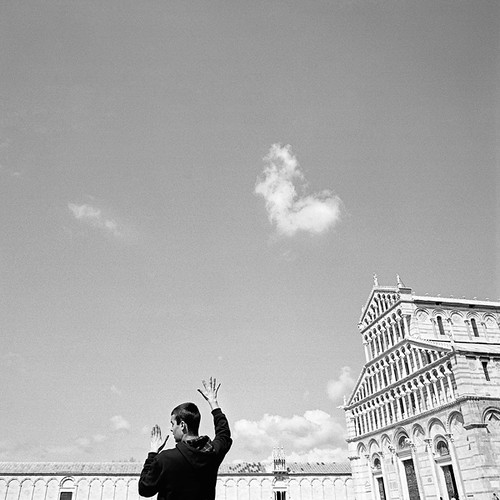SimonSawSunlight
Simon Fabel
(I read stuff for university, made notes about my associations and elaborated them a little...)
an object, or artefact, or subject even, is always a product. right?
a product on both ends; where it came from and by whom it is perceived.
an object always has multiple sides. also, an object can appear bigger or smaller from a certain side compared to another.
which side, or, preferrably: sideS, one contemplates is retroactively essential for the constitution of this product, thus for the 'reality' of the given object.
because our perception and the efforts to describe and understand it are the only reality we have. (and I assume that the process of settling for it usually takes longer than a human life's time.)

while a writer or rather 'linguistic mediator' is granted the constraint, to start describing a thing at some point and to continue chronologically in one way or another, the documentary photographer suffers the luxury of being able to depict a view on the 'whole' thing (but not its complete entity of course) at once.

photography is just a language without grammar. although, compared to our generic spoken/written language, it is simpler for it to be complicated. or just complex.
the flexible 'pronunciation' of the photographic language, compared to our generic spoken/written language, is more important for its communication and understanding than syntax or grammar in general (which, as stated above, probably doesn't exist out of this reason.)
these doggerel but grammatically more or less correct lines of mine probably just underlined my point.

based loosely on Ute Daniel: whoever feels bored by it nonetheless, can just go look at something else instead of shooting him- or herself.
an object, or artefact, or subject even, is always a product. right?
a product on both ends; where it came from and by whom it is perceived.
an object always has multiple sides. also, an object can appear bigger or smaller from a certain side compared to another.
which side, or, preferrably: sideS, one contemplates is retroactively essential for the constitution of this product, thus for the 'reality' of the given object.
because our perception and the efforts to describe and understand it are the only reality we have. (and I assume that the process of settling for it usually takes longer than a human life's time.)

while a writer or rather 'linguistic mediator' is granted the constraint, to start describing a thing at some point and to continue chronologically in one way or another, the documentary photographer suffers the luxury of being able to depict a view on the 'whole' thing (but not its complete entity of course) at once.

photography is just a language without grammar. although, compared to our generic spoken/written language, it is simpler for it to be complicated. or just complex.
the flexible 'pronunciation' of the photographic language, compared to our generic spoken/written language, is more important for its communication and understanding than syntax or grammar in general (which, as stated above, probably doesn't exist out of this reason.)
these doggerel but grammatically more or less correct lines of mine probably just underlined my point.

based loosely on Ute Daniel: whoever feels bored by it nonetheless, can just go look at something else instead of shooting him- or herself.
Last edited:

